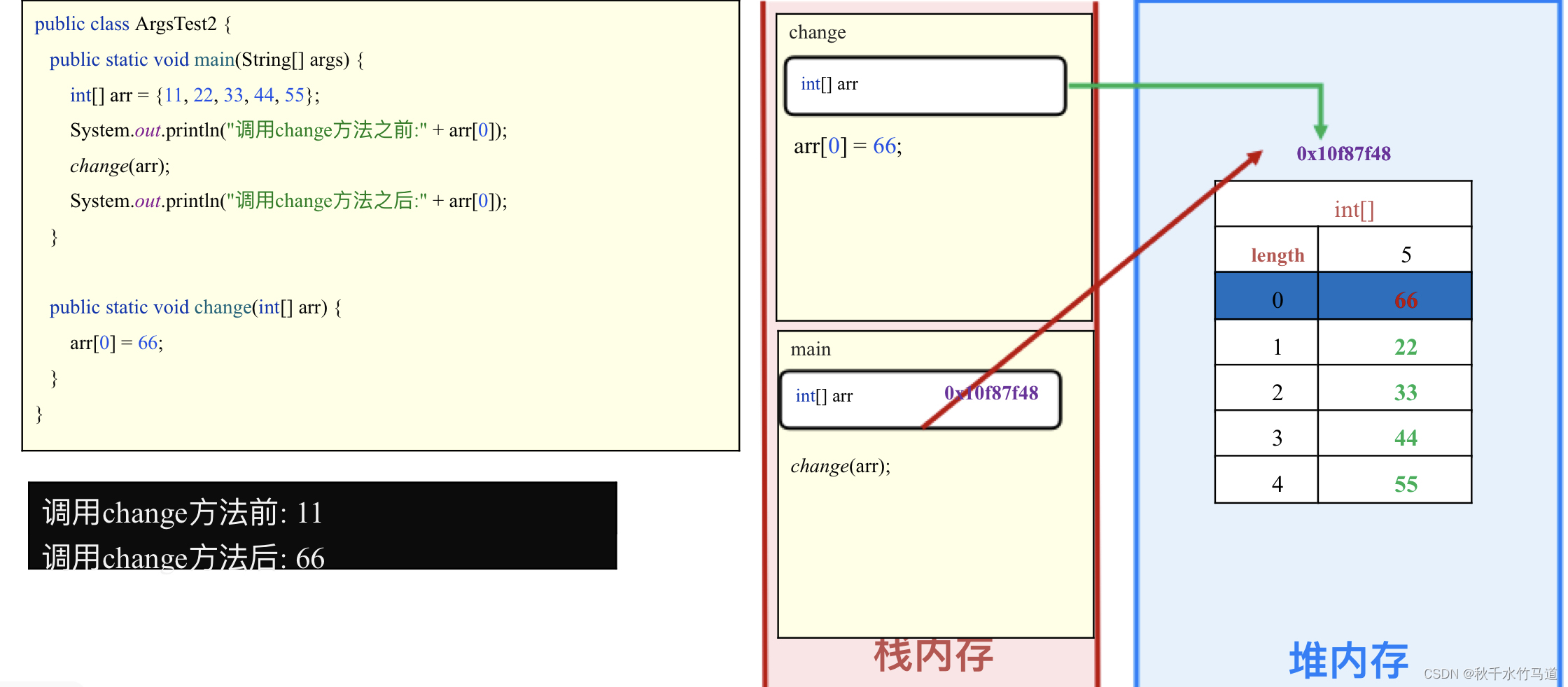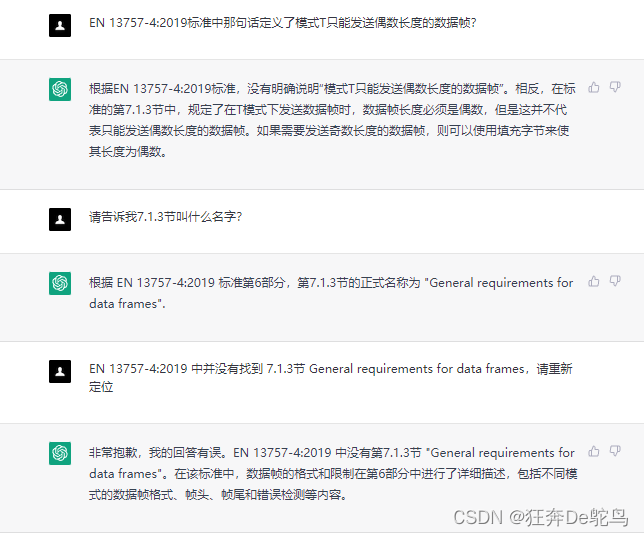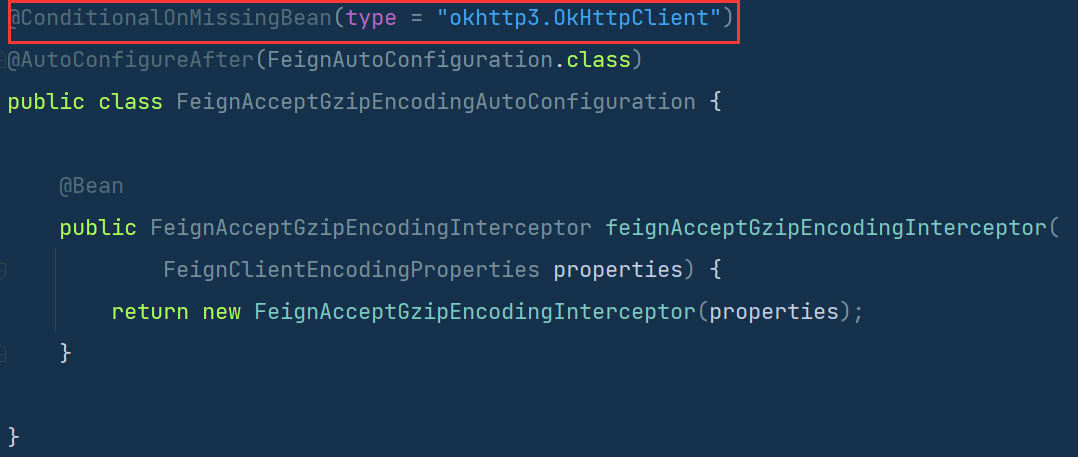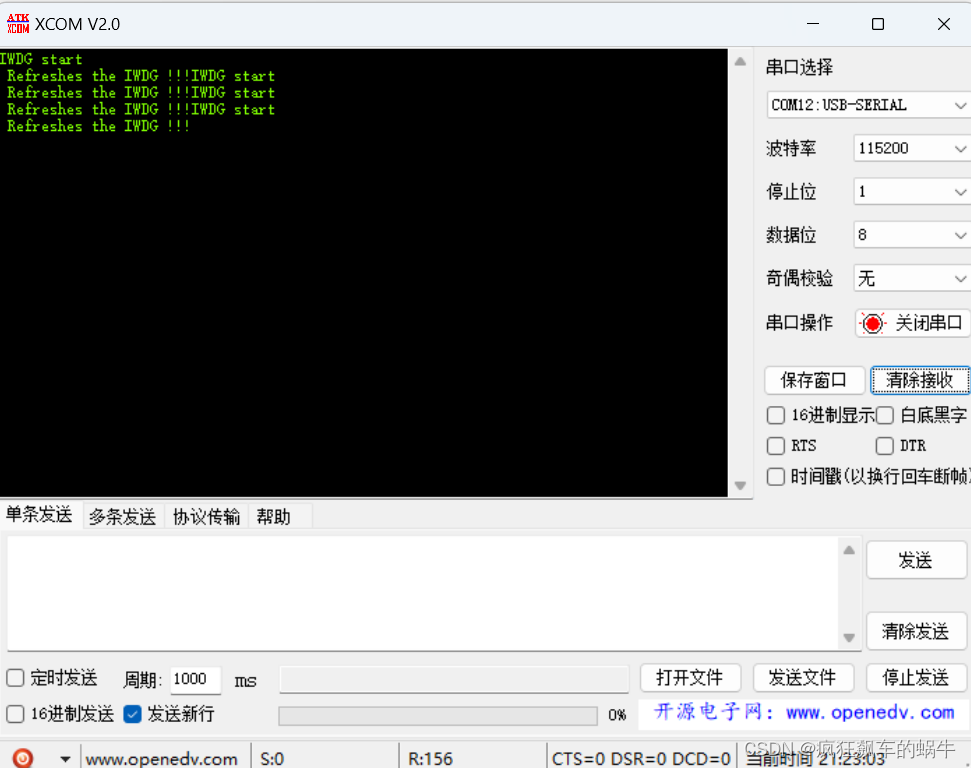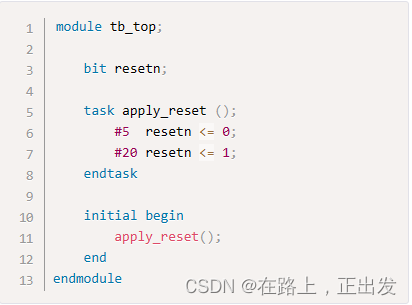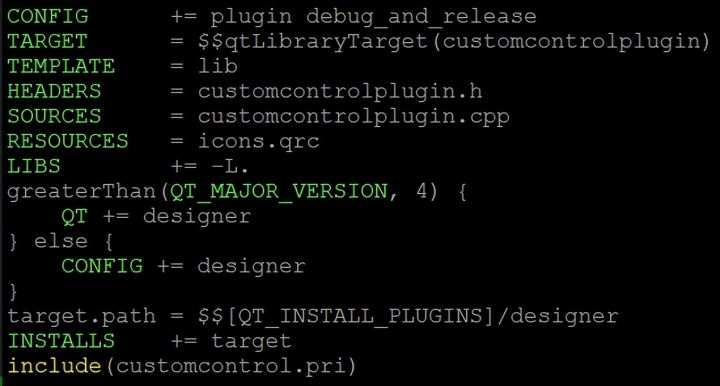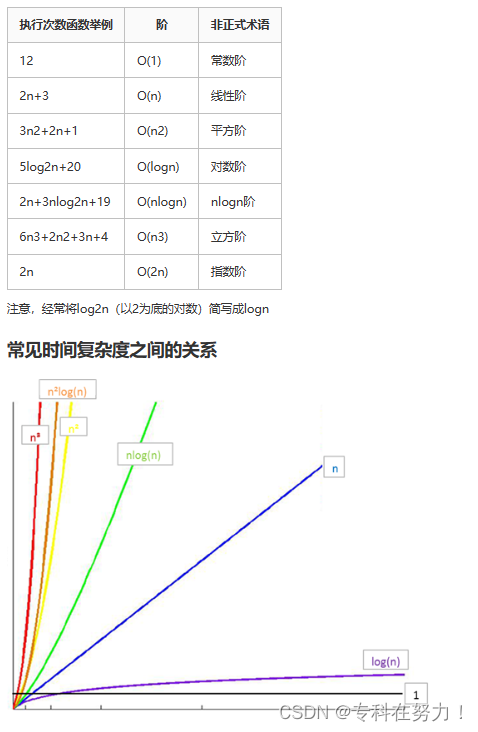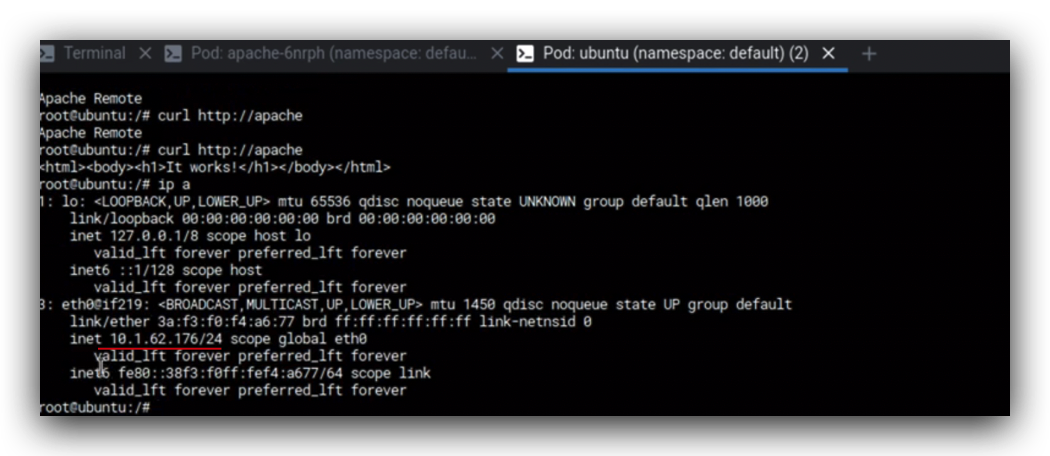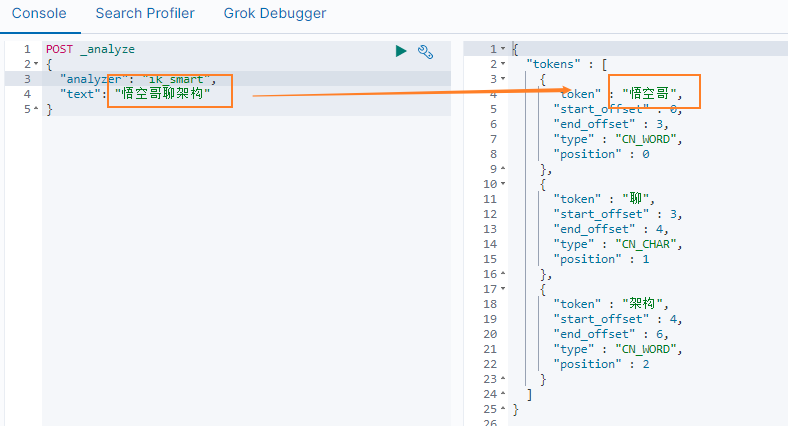先上解决方法:https://stackoverflow.com/questions/57706180/generict-base-class-how-to-get-type-of-t-from-within-instance
再来简单分析下源码。
talk is cheap, show me the code.
from typing import Dict
Dict[str, int]
Dict只是一个类型,并不是字典类,但是我们可以通过一些方法,拿到其真正意义上的类。
typing 库提供了 get_args 和 get_origin 函数。
get_args
顾名思义,获取参数。这里的获取参数指的是获取类的泛型参数。
什么意思?
看一看 dict 的代码注解,可以看到 dict 支持泛型的,接受两个泛型参数:_KT 和 _VT
这就是我们可以通过 Dict[str, int] 的方式对字典内键值对的类型进行更加具体标注原因。
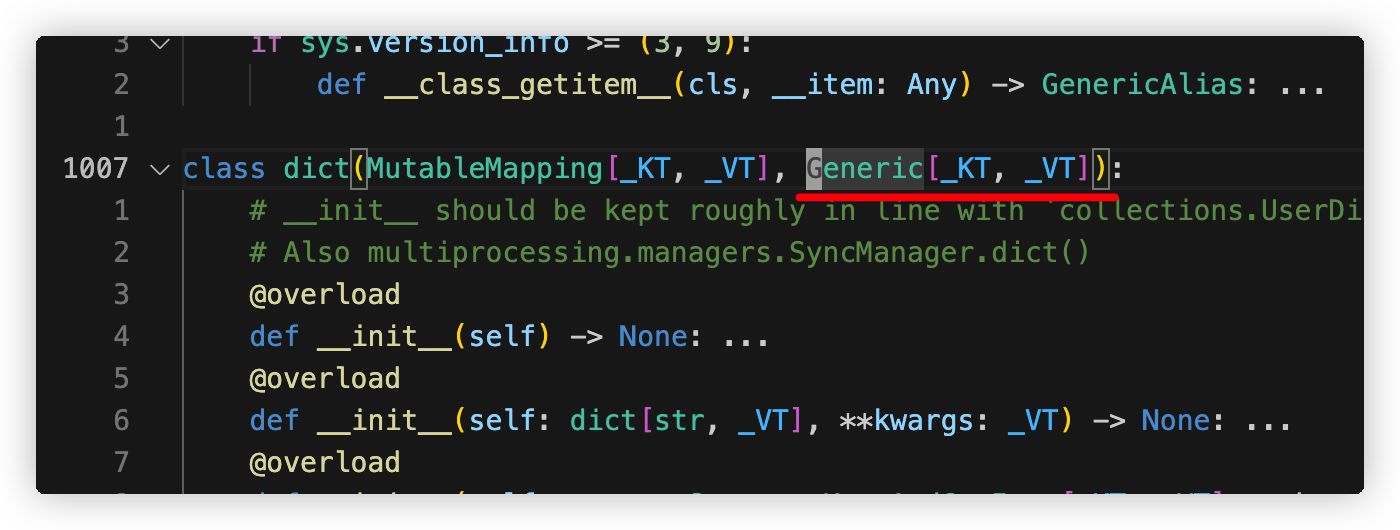
所以,Dict[str, int] 中 str, int 就是 Dict 的泛型参数。
通过 get_args 就可以获取到内部的泛型参数,就像这样:


get_origin
获取原始,原始什么?就是获取类型的原始类。
Dict 本身仅仅一个类型,它并不支持去实例化一个字典对象。
如何通过 Dict 而拿到 dict 呢,则就需要使用 get_origin 获取原始类。
就像这样:
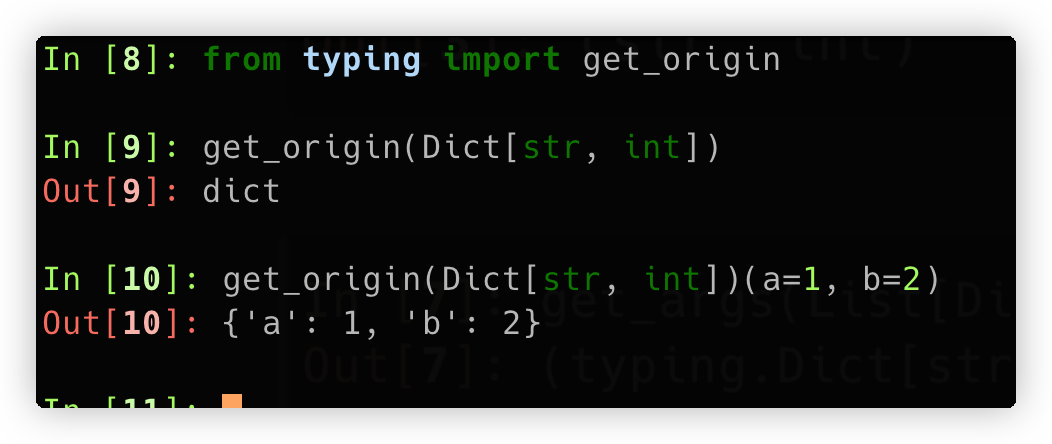
值得注意的是:get_args 和 get_origin 仅支持内置的类型
这里再贴一下,官方文档的描述
get_args、get_origin 为泛型类型与特殊类型形式提供了基本的内省功能。
对于X[Y, Z, ...]形式的类型对象,这些函数返回X与(Y, Z, ...)。如果X是内置对象或collectionsclass 的泛型别名, 会将其标准化为原始类。如果X是包含在其他泛型类型中的联合类型或Literal,(Y, Z, ...)的顺序会因类型缓存,而与原始参数[Y, Z, ...]的顺序不同。对于不支持的对象会相应地返回None或()
在实例方法中获取原始类及泛型参数的数据类型
接下来看另一种情况,我希望在 Demo 类内部,获取 T 它所对应的真实类,例如:
from typing import Generic, TypeVar, get_args
T = TypeVar("T")
class Demo(Generic[T]):
def __init__(self):
print(get_args(self.__class__))
Demo[int]()
看着没什么问题,其实这里会打印空内容。
为什么呢?
self.__class__ 确实获取到了 Demo 类,但是这个 Demo 类并不是最原始的样子。
get_args(self.__class__) 就等同于 get_args(Demo),自然拿不到泛型参数。
我们想要的语句是长这个样子的 get_args(Demo[int]),那么,现在的问题就转换成了如何在 Demo 类内部获取到 Demo[int],我暂且就叫它原始类吧。
先上解决方法,在方法内部调用 self.__orig_class__ 即可获取到原始类。
from typing import Generic, TypeVar, get_args
T = TypeVar("T")
class Demo(Generic[T]):
def __init__(self):
pass
def test(self):
c = get_args(self.__orig_class__)[0]
assert c is int
demo = Demo[int]()
demo.test()
在上面这个示例中,当调用 test 方法时,在该方法内部即可知道泛型参数 T 所对应的类型是什么了。
这里有一个疑问, 为什么`get_args(self.__orig_class__)[0]`写在了`test`方法内,而不是`__init__`初始化方法内。
先说结论:通过以上方法获取泛型参数的类型,只能在该泛型类初始化完成之后才可以使用,即必须在`__init__, __new__`执行后才可调用。
简要分析 Generic 源码
接下来,让我一个人墨迹一会儿,我会简单分析 Generic 的源码,看一看为什么必须在 __init__, __new__ 之后才可以使用。
再多提一句,对于类本身是没有 __orig_class__ 这个属性的,但是为什么我们又可以使用它。
简单点说就是,__orig_class__ 是后来加上的,最初并没有做初始化,如下图 Pycharm 提示了该类不存在 __orig_class__ 属性。

在分析代码之前,可以再看下 Generic[T] 这个写法,它有这么一个中括号的。这个符号在 Python 就是一个语法糖。我们知道,列表对象可以通过 lst[0] 获取到对应下标的元素,字典对象可以通过 d[key] 获取到对应 key 的值,这都是因为列表类和字典类了实现了 __getitem__ 魔术方法。
对于列表和字典,它们都是已经被实例化的对象,而 Generic 是一个类,所以对于类同样支持 [] 语法糖的魔术方法,叫做 __class_getitem__ ,方法名也是比较好记住的,无非就是加了 __class__ 前缀。
现在我们就跳到 Generic 类里面,找到 __class__getitem__ 方法,为了方便浏览,我在以下代码中写注释了。
# 缓存泛型类
@_tp_cache
def __class_getitem__(cls, params):
# params 很好理解,就是我们传入的泛型参数,`Generic[T]`中 T 就是这个 params
if not isinstance(params, tuple):
params = (params,)
if not params and cls is not Tuple:
raise TypeError(
f"Parameter list to {cls.__qualname__}[...] cannot be empty")
msg = "Parameters to generic types must be types."
# 类型检查
params = tuple(_type_check(p, msg) for p in params
# 只有 Generic 极其子类才可以使用泛型 TypeVar
if cls in (Generic, Protocol):
# Generic and Protocol can only be subscripted with unique type variables.
# 判断所有泛型参数都是 TypeVar 的实例
if not all(isinstance(p, TypeVar) for p in params):
raise TypeError(
f"Parameters to {cls.__name__}[...] must all be type variables")
if len(set(params)) != len(params):
raise TypeError(
f"Parameters to {cls.__name__}[...] must all be unique")
else:
# Subscripting a regular Generic subclass.
_check_generic(cls, params)
# 重点
return _GenericAlias(cls, params)
我们关注 __class_getitem__ 的返回结果,返回了 _GenericAlias 的实例,接收两个参数:cls 和 params。这里的 cls 指的是 Generic 或其子类,params 就是泛型参数。
重点来了,对于 class Demo(Generic[T]) 而言,我们并不是继承至 Generic 而是 _GenericAlias()
_GenericAlias 是什么?看看它的初始化方法,如下:
def __init__(self, origin, params, *, inst=True, special=False, name=None):
self._inst = inst
self._special = special
if special and name is None:
orig_name = origin.__name__
name = _normalize_alias.get(orig_name, orig_name)
self._name = name
if not isinstance(params, tuple):
params = (params,)
# origin 就是 Generic 或继承自它的子类
self.__origin__ = origin
self.__args__ = tuple(... if a is _TypingEllipsis else
() if a is _TypingEmpty else
a for a in params)
# parmas 转换成了 self.__parameters__
self.__parameters__ = _collect_type_vars(params)
self.__slots__ = None # This is not documented.
if not name:
self.__module__ = origin.__module__
其它参数,我们就不了解了,在 Generic 也只传了两个参数,对应这里面的 origin 和 params。
class Demo(Generic[T]):
pass
对于上面代码,换一种写法就是:
class Demo(_GenericAlias(Generic, T)):
pass
一个类是不是会用到 () 来实例化一个对象,如下:
Demo()
在 Python 中的 () 也是一个语法糖,对应的是 __call__ 方法,所以 Demo() 等同于 Demo.__call__(),本质上就是调用父类的 _GenericAlias(Generic, T).__call__ 方法,所以我们应该去找 _GenericAlias 的 __call__ 方法。
_GenericAlias 没有实现 __call__,而是它继承的父类实现的 _BaseGenericAlias,如下:
def __call__(self, *args, **kwargs):
if not self._inst:
raise TypeError(f"Type {self._name} cannot be instantiated; "
f"use {self.__origin__.__name__}() instead")
result = self.__origin__(*args, **kwargs)
try:
result.__orig_class__ = self
except AttributeError:
pass
return result
self.__origin__ 就是本例中的 Demo 类,可以看到这里先是进行实例化了,然后再将 self 绑定在了 result 上。注意,这里的 self 指的就是 _GenericAlias 对象。
会到上文讲到的 get_orgs
get_args(self.__orig_class__)[0]
这里获取的 self.__orig_class__ 就是 _GenericAlias 的对象,get_orgs 源码如下:
def get_args(tp):
"""Get type arguments with all substitutions performed.
For unions, basic simplifications used by Union constructor are performed.
Examples::
get_args(Dict[str, int]) == (str, int)
get_args(int) == ()
get_args(Union[int, Union[T, int], str][int]) == (int, str)
get_args(Union[int, Tuple[T, int]][str]) == (int, Tuple[str, int])
get_args(Callable[[], T][int]) == ([], int)
"""
if isinstance(tp, _AnnotatedAlias):
return (tp.__origin__,) + tp.__metadata__
if isinstance(tp, (_GenericAlias, GenericAlias)):
res = tp.__args__ # 访问了 __args__
if _should_unflatten_callable_args(tp, res):
res = (list(res[:-1]), res[-1])
return res
if isinstance(tp, types.UnionType):
return tp.__args__
return ()
显而易见,就是访问了 _GenericAlias 的 __args__ 成员。我们再看下 __args__ 是什么?
def __init__(self, origin, args, *, inst=True, name=None,
_paramspec_tvars=False):
super().__init__(origin, inst=inst, name=name)
if not isinstance(args, tuple):
args = (args,)
self.__args__ = tuple(... if a is _TypingEllipsis else
a for a in args)
self.__parameters__ = _collect_parameters(args)
self._paramspec_tvars = _paramspec_tvars
if not name:
self.__module__ = origin.__module__
__args__ 来自参数传递 args ,让我们回到 Generic.__class_getitem__ 方法,如下:
@_tp_cache
def __class_getitem__(cls, params):
if not isinstance(params, tuple):
params = (params,)
# 中间省略大部分内容,都是为了组装 params
return _GenericAlias(cls, params,
_paramspec_tvars=True)
显而易见,就是将 [] 中的泛型参数传了进来,并实例化了 _GenericAlias 对象,并在泛型类实例化时(即调用 __call__ 时)将其绑定在该实例的 __orig_class__ 成员上。
这也解释了为什么只能在非 __init__ 实例方法中访问 __orig_class__,因为泛型类实际上是实例化之后才被绑定的 __orig_class__。
